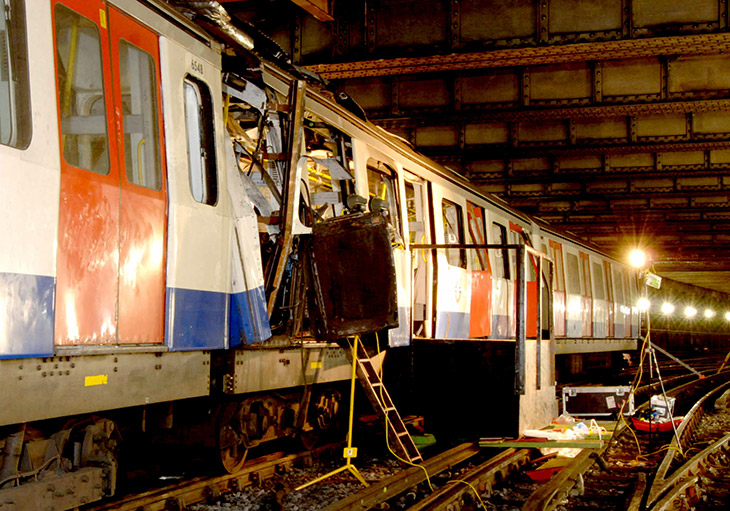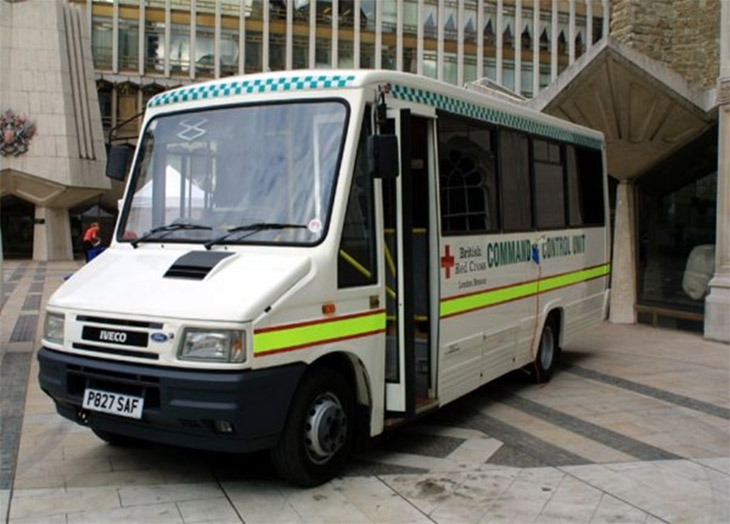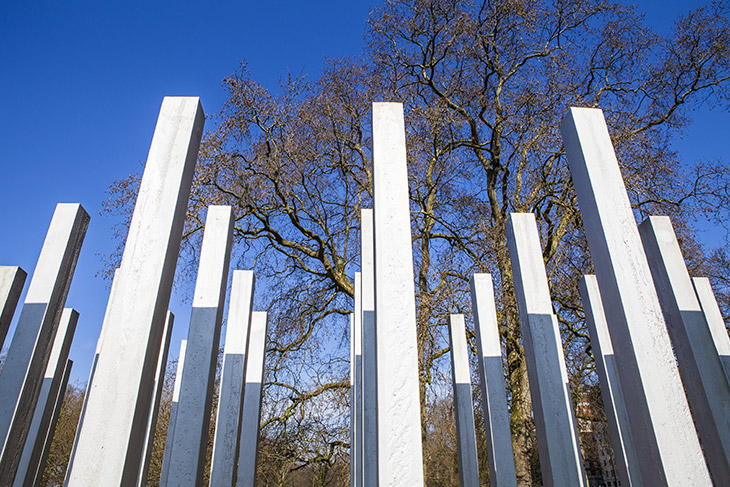London Bomb attacks ten years on
July 7, 2015 is the tenth anniversary of the London bomb attacks, in which 52 people died. Here, Red Cross volunteer Roland Harris, remembers that day in a personal account, and CRJ has made its reports on the incidents available to readers.
I remember clearly what I was doing when I heard about the 7/7 attack. That day, myself and a number of other Red Cross volunteers were working at an event, commemorating WW2, at St James’s Park.

One of the trains involved in the attack (photo Empics)
It was just another day for us, providing first aid support; I was co-ordinating communications from our purpose-built communications vehicle.
In this vehicle, our team often listened to the London Ambulance Radio alerts to keep an ear out for any incidents occurring in the region. Early in the morning, we were listening as normal, when we heard a call-out to a major event at a tube station. From the initial description, it was thought it must have been an electrical explosion, but then we heard another two similar incidents announced and started to listen more closely. It soon became clear that something more serious had happened.
Within the next half an hour it was established there had been a major terrorist attack. The Red Cross in London was called by the London Ambulance Service (LAS) and asked to co-ordinate Red Cross support.
My colleague was delegated as the Red Cross ‘Silver,’ putting him in charge of the Red Cross response and I was delegated to co-ordinate our communications with ambulances and first aid response. We were asked if our Red Cross teams could man all mainline tube stations in case of further attacks.

The Red Cross communications vehicle
We had both received training in large-scale response, as well as having some experience dealing with similar events, although none as large as this.
We sent out the call for volunteers and ambulances, and teams of volunteers were quickly deployed to the big stations in London, such as Victoria and Paddington, as well as commuter hubs such as Reading. We also had around 20 ambulances on standby around the M25 and at Uxbridge Red Cross Centre.
During the course of the morning I was asked to attend the LAS Headquarters in Waterloo to act as liaison for the Red Cross. I was taken to its offices under ‘blue light’ conditions in the rear of a 4X4. As I arrived, I noticed that a London bus had been abandoned outside the LAS building. This was seen as a potential threat, but we were told not to panic, so just carried on with our work. It wasn’t until later I noticed that the bus had gone. I never found out what had happened to it. Perhaps a driver had abandoned it after being stuck in traffic and then come to collect it later on that day.
Staff and volunteers from the Red Cross worked solidly until late that evening supporting the LAS and answering inquiries, many of which were from people who were, understandably, distressed and frightened. Our teams were also asked to provide support to people coming off the trains from London at Reading where many people were traumatised by the day’s events.
I think having the Red Cross at the stations was really important because it showed people that: “We are here. It’s ok. Life must go on.” Our volunteers didn’t think about the potential risks to themselves, they just got on with their jobs. There was a wonderful sense of solidarity and community spirit.
People made signs saying: “We are not afraid,” and shops and cafés handed out free food and drinks to people in the street, providing support and comfort during what was a scary and shocking time.

The memorial erected to remember those who were killed (photo: chrisdorney / Shutterstock)
In Waterloo a kind fish and chip shop owner donated free meals to everyone working at the LAS, and this was very much appreciated.
It was obviously a very difficult day, but the Red Cross volunteers just continued with their work, people were too busy to be worried. It wasn’t until late that evening people thought about what had actually happened, and realised the enormity of the events. It isn’t until you stop working that you have a minute to really take it all in. 7/7 wasn’t the first time Red Cross volunteers have had to deal with a difficult and large incident, and sadly I doubt it will be the last. That is why we ensure that we are always ready to respond in order to help people in crisis in whatever way we can.
Roland Harris has volunteered his time and expertise to the Red Cross in London for over 40 years. He currently co-ordinates volunteers assisting with Operational Communications and provides Logistics support to the service. He also looks after the London Communications vehicle. He is currently the chair if the South of England EFA SDG (Event First Aid Service Development Group - ) Operational Communications Sub Group.